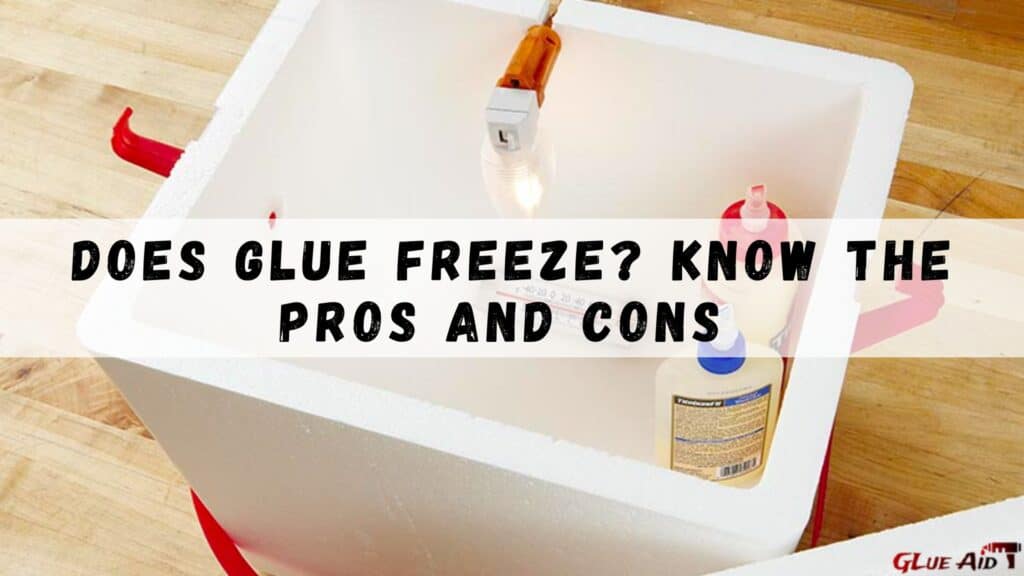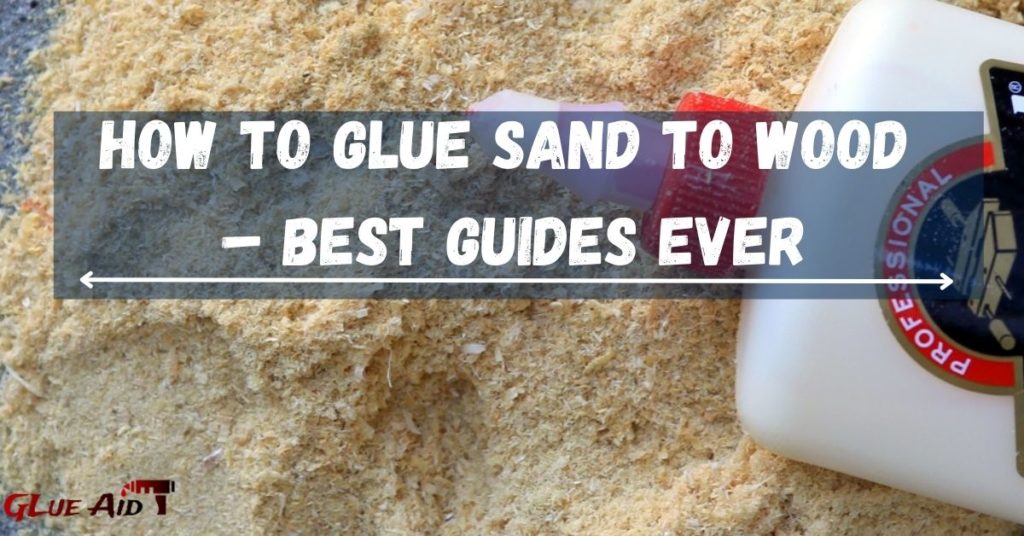Glue is an important tool for many crafts, but what happens when it freezes? Does the glue still work? And if it doesn’t, is there any way to fix it? These are questions that many people may ask, so today we’re going to take a closer look at glue and freeze.
The answer to the question, “does glue freeze,” is a little more complicated than a simple yes or no. The answer depends on the type of glue being used. Most cyanoacrylate glues, also known as superglues, will not freeze. However, polyvinyl acetate glues, or white glues, will freeze and will not bond when thawed.
Table of Contents
Does Glue Freeze?

Most adhesives, including glue, are designed to withstand freezing temperatures. However, extremely cold temperatures can cause some adhesives to become brittle and less effective. If you’re using glue in a very cold environment, it’s important to test the adhesive beforehand to make sure it will still work properly
To avoid freezing, store glue in a cool, dry place. You can also keep it stored in an airtight container to further protect it from the elements. If you’re using a water-based adhesive, be sure to keep it away from moisture, as this can cause the glue to freeze.
If your glue has frozen, you may still be able to use it, but the freezing process can damage the adhesive. To thaw frozen glue, place the container in a warm environment until the glue has melted. Once thawed, test the adhesive to see if it’s still effective. If not, you’ll need to get a new bottle of glue.
With proper storage, most adhesives will withstand freezing temperatures. However, it’s always best to test the adhesive before using it in very cold conditions.
What Happens If Glue Freezes

If you’ve ever left a glue stick in the car on a cold day, you may have noticed that it gets harder to use. That’s because glue sticks are designed to melt at a specific temperature, and when they freeze, the glue can become brittle and difficult to work with.
Elmer’s glue is a water-based adhesive, which means that it is mostly composed of water. When water freezes, it expands. This expansion can cause the glue to break down, resulting in a less effective adhesive. In extreme cases, the expanding water can cause the container to break, allowing the glue to leak out.
If you are using Elmer’s glue and it freezes, it is best to discard it and start with a new batch. However, if you are in a pinch, you can try thawing the glue slowly and carefully. Place the container in a bowl of warm water and stir gently until the glue has liquefied. Once thawed, the glue may not be as effective as it was before freezing, but it should still be usable.
What Type Of Glue Can Be Frozen?

Most adhesives will not freeze well. This is because the freezing process can damage the delicate ingredients in the glue, making it less effective. However, there are a few types of glue that can be frozen without any problems.
First, cyanoacrylate adhesives, also known as super glues, are designed to withstand low temperatures. This makes them ideal for use in cold weather or for bonding materials that will be exposed to extreme cold.
Second, epoxy adhesives are also resistant to freezing. They provide a strong bond and can be used on a variety of materials, including metal, glass, and plastic.
Finally, hot glue guns use glue that is already in a liquid state. This means that it can be easily reheated if it freezes, making it a versatile choice for bonding different materials.
What Temperature Does Glue Freeze
Most adhesives are designed to withstand freezing temperatures. However, extremely cold temperatures can cause some adhesives to become brittle and less effective. If you’re using glue in a very cold environment, it’s important to test the adhesive beforehand to make sure it will still work properly
To avoid freezing, store glue in a cool, dry place. You can also keep it stored in an airtight container to further protect it from the elements. If you’re using a water-based adhesive, be sure to keep it away from moisture, as this can cause the glue to freeze.
If your glue has frozen, you may still be able to use it, but the freezing process can damage the adhesive. To thaw frozen glue, place the container in a warm environment until the glue has melted. Once thawed, test the adhesive to see if it’s still effective. If not, you’ll need to get a new bottle of glue.
FAQ About Does Glue Freeze
Can You Freeze Superglue?
Superglue can be frozen, but it is not recommended because the glue will become brittle and may not work as well.
Can You Freeze Elmer’s Glue?
It is also possible to freeze Elmer’s glue; however, doing so will cause the adhesive to become brittle and less effective. If you need to store Elmer’s glue for an extended period of time, it is best to keep it in the refrigerator.
Can You Freeze Gorilla Glue?
Gorilla glue is a cyanoacrylate adhesive, which means it is a fast-acting adhesive that forms a bond by polymerizing when it comes into contact with moisture. This means that it can be difficult to freeze gorilla glue, as doing so would likely ruin the adhesive properties.
How Can You Tell If Your Liquid Adhesive Has Frozen?
There are several ways to tell if your liquid adhesive has frozen. One way is to check the adhesive’s temperature. If the temperature is below the freezing point, then the adhesive has likely frozen. Another way to tell is to look at the adhesive’s consistency.
What Happens To Wood Glue When It Freezes?
The adhesive properties of wood glue are affected by the temperature. In cold weather, the glue will become stiff and difficult to apply. At very low temperatures, the glue may freeze and become brittle.
Does Glue Freeze In The Freezer?
The freezer is a great place to store food, but it is not the best place for glue. Glue can freeze in the freezer, and when it thaws, it may not be as effective.
How Long Does It Take Glue To Freeze?
It takes glue a certain amount of time to freeze, depending on the environmental conditions. In general, the lower the temperature, the faster the glue will freeze. However, other factors such as humidity can also play a role. If you want to be precise, you would need to perform some experiments in order to determine the exact freezing point of the glue.
Tips & Tricks To Avoid Glue From Freezing
-Store glue in a cool, dry place.
-Keep glue stored in an airtight container.
-If using a water-based adhesive, keep it away from moisture.
-To thaw frozen glue, place the container in a warm environment until the glue has melted
-Once thawed, test the adhesive to see if it’s still effective.
Final Words
The answer to the question “Does glue freeze?” is yes. The glue will freeze at approximately 0 degrees Fahrenheit. This information is important to know if you are working with glue in cold weather conditions. The glue will freeze if left in a cold environment for an extended period of time. The glue that has frozen can be thawed and used, but it is important to note that the glue may not work as well after it has been frozen.
Relevant Resources:
- What Glue to Use for Paper Glass
- How To Dry Glue Faster – 9 Best Ways
- How to Fix a Hole in an Air Mattress With Super Glue
- Why Doesn’t Glue Stick to The Inside of The Bottle or Tube
- The Pros and Cons of Polyurea Adhesives
- Is Glue Edible? – See What Experts say
- Is Glue bad for your Skin -Things You Must Know
- How To Glue Sand to Wood – Best Guides Ever
- How to Glue Glass to Wood
- How to Glue Rubber to Wood
- How to Glue Metal to Glass
- How to Get Hair Glue out of Carpet
- Is Glue Made from Horses
- How To Glue Metal To Concrete




